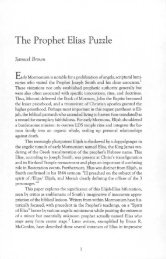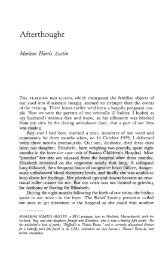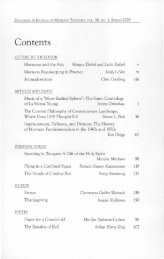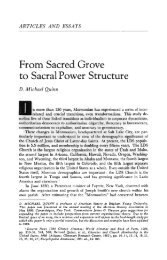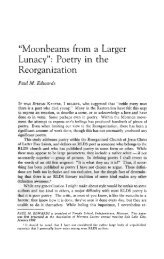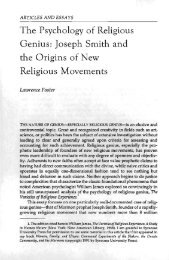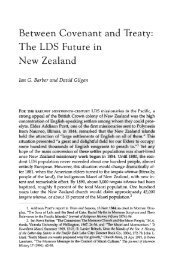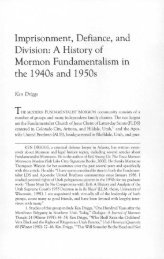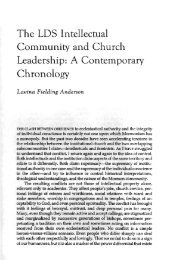Dialogue, Volume 25, Number 2 - Dialogue – A Journal of Mormon ...
Dialogue, Volume 25, Number 2 - Dialogue – A Journal of Mormon ...
Dialogue, Volume 25, Number 2 - Dialogue – A Journal of Mormon ...
Create successful ePaper yourself
Turn your PDF publications into a flip-book with our unique Google optimized e-Paper software.
156 DIALOGUE: A JOURNAL OF MORMON THOUGHT<br />
A few minutes later, we knocked at the new family's door. No<br />
answer. We knocked again. Nothing. My companion wanted to wait<br />
awhile; this family was golden, he said. While he read scriptures, I<br />
stared across the street at people going in and out <strong>of</strong> the post <strong>of</strong>fice,<br />
wishing I could trade places with any one <strong>of</strong> them, even wishing I<br />
could be one <strong>of</strong> the shoeshine boys who slept there in the park. After<br />
fifteen minutes, we gave up and left. For the first time, I was pleased<br />
no one had opened the door. I knew I had nothing to teach, nothing to<br />
share. I wondered if I ever could call myself a representative <strong>of</strong> Jesus<br />
Christ again. If I wasn't willing to minister to those who suffered<br />
most, what in the hell was I doing on a mission?<br />
As we walked away from the unanswered door, I told my disappointed<br />
companion that I needed to buy some envelopes —my ploy to<br />
lead us back up the street where the old beggar sat. This time I would<br />
stop. I would squat down beside him. I would ask his name and shake<br />
his dusty hand. My fingers would feel the hardened knuckles that propelled<br />
him through the streets. I would ask God to help me do the<br />
right thing.<br />
But the doorway was empty; the man was gone.<br />
My mission seems long past, almost as long ago as the Targeteer<br />
class where I first announced my understanding <strong>of</strong> Zion. Since then<br />
my experiences with attempted Utopias continue to be disheartening.<br />
I've worked on a Kibbutz in Israel, clearing drip-irrigation lines in the<br />
banana fields. The work was strenuous and —worst <strong>of</strong> all —boring. We<br />
started before sunrise and finished before noon. Then we were free.<br />
We could eat our fill without price, swing from a rope into the Jordan<br />
River, or skinny-dip in the Sea <strong>of</strong> Galilee. But we never were a real<br />
part <strong>of</strong> their community. The kibbutzniks paid us a dollar a day, and<br />
we wore our own shoes, not the leather sandals issued by the kibbutz.<br />
In the People's Republic <strong>of</strong> China, I visited a carpet factory. I saw<br />
the worn wooden bench where Chinese citizens would —in theory —sit<br />
for their entire working lives, tying the same knot, over and over and<br />
over. One carpet might require an entire year's work. Western tourists<br />
would then buy the carpets for a few hundred dollars, and the citizens<br />
would start on a new loom. To enjoy their own carpet in their own<br />
home: impossible. Everything belonged to the state: the factory, the<br />
bench, the loom, the yarn, their tired fingers, their children, and even<br />
their dreams —all for the benefit <strong>of</strong> the state.<br />
In India I sat a full day by the River Ganges and watched the<br />
pilgrims bathe, drinking in the holiness. They all seemed to have their<br />
own rituals —chants, washings, prayers —yet all were entranced. In<br />
the late afternoon, a young Indian explained to me the meaning <strong>of</strong> the<br />
burning pyre nearby and reminded me not to take photographs.








